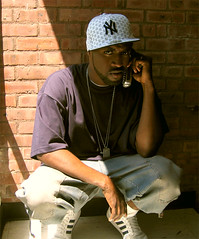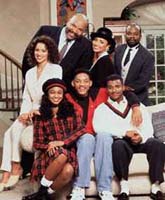How the Black Bourgeoisie Ruined [My] MLK Day: Part 2
i found [the poem] to be very cosby in its short-sighted finger-pointing. very pound cake speech.
i wish our community could be more self-affirming and less divisive when issuing critique and calls for action.
"please don't tell martin" that we're still sponsoring the artless vilification of the black working class and creating paper-thin assessments of the black middle class. and don't tell larry, either.
but after a friend pointed out how some of the newer bruthas on the listserv might experience my email as unnecessarily abrasive, i offered the following explaination:
Poems, speeches and other tirades decrying black folks’ supposed obsession with “diamond clad teeth, 24 inch rims, and designer clothes” are not hard to come by. The “what’s wrong with niggers?” speech is an unfortunate mainstay in American culture.
See also: Bill Cosby’s “pound-cake speech”
Chris Rock’s “black people vs. niggers” routine
The widely circulated “KKK Letter to Young Black Men”
The infamous letter from “A Disgusted White Woman”
And everyone's favorite "They Are Still Our Slaves"
As such, I don't find the "Please Don't Tell Martin" piece to be exceptional, unique or insightful.
Pieces like “Please Don’t Tell Martin” are circulated frequently and widely because they serve an important function in our society: they allow us to lambast the immorality of the black working class. They offer an unsympathetic vilification of the “ghetto people” on the basis of their shiftlessness, inviduous consumption and lascivious nature. They routinely ignore or understate the impact of forces like institutional and systemic racism and classism, and uncritically indict “ghetto people” for their failure to magically, instanteously and single-handedly “rise above” the monoliths of stratification upon which this nation was built.
But why? What is to be gained by black folks creating such divisive constructions? What common thread unites these attempts to classify and penalize large portions of the black community?
To answer this question, I point to the concept of “typing” as outlined in the introduction of Elizabeth Johns’s book “Amercian Genre Painting: The Politics of Everyday Life”.
“As anthropologists and students of popular culture have long known, "typing" is part of the larger process by which human beings assert, parcel out, and deny power to members of their communities.
Typing is often initiated by those who would be at the apex of the society, but it also undertaken by beings in middling situations and at the bottom of societies. People variously distinguish those around them by class, gender, age, intelligence, and manners and set up targets for satire or condescension that satisfy their need for superiority...
In virtually every instance, it seems, is carried out as a harmless, natural activity. That is, persons doing the typing usually do not recognize the interests behind their constructions and at other times pointedly deny them and see the typing as perfectly natural."
I read “Please Don’t Tell Martin” as a clear example of typing. It invites us to shake a disapproving finger at “thugs”, “hoochies” unwed mothers, strippers and other “ghetto” inhabitants without any context whatsoever. And, in so doing, the piece allows those of us who read and circulate it to demonstrate our adherence to and celebration of the moral standards of the “civilized” (read: white upper class) world. To be clear, this is a boat I'm not willing to board.
And none of this is undermined by the piece’s paper-thin treatment of the black middle class. Isn’t it conspicuous that the only qualm that the author can find with the middle class is that they don’t give back to the black community?
In no uncertain terms, I find that the piece’s popularity lies in the fact that it sets up the black working class as targets for satire and condescension in ways that satisfy the need for superiority held by those invested in rising from those ranks as well as those who have no genuine understanding of “ghetto” life.
Further, the piece paints a portrait of black morality that is ahistorical, culturally ignorant and occasionally contradictory. As per the mandate of the poem, one must be a respectably dressed, civically engaged, gainfully employed, church-going, Negro spiritual singing, hood dwelling democrat with a nuclear family, natural hair and no criminal record.
Of course, there’s no mention of the fact that gainful employment isn’t always easily attainable for black and brown folks; that the homophobia and misogyny of the church has failed many of us; that the democratic party has failed even more of us; that the nuclear family structure has never been a reality for Africans in America; that the legal and judicial systems don’t always work in our favor.
And this, my bruthas, is why I found the piece to be very Cosby in its short-sighted finger-pointing. And this is why I wished that our community could be more self-affirming and less divisive when issuing critique and calls for action.
My critique of the artless (and downright trite) vilification of the black working class and the paper-thin assessments of the black middle class stand.
I was compelled to comment on “Please Don’t Tell Martin” because I felt two things.
1. Given Coretta’s life work of bettering the conditions for blacks in general and the working class in particular, that the “poem” (and I use that word loosely) was a irresponsible use of Mrs. King’s name.
2. Remaining silent about the piece’s function as a form of typing would amount to my tacit acceptance of its claims. To see this piece to hit BMAG without someone saying, “Hey, the analysis here is problematic and short-sighted” would cause me to question our collective consciousness.
I offer my voice as a voice of dissent fully believing that I’m not the only brutha on here who saw the nefarious work that emails, poems, speeches and letters of this sort do.
I hope you guys can appreciate that.
Best,
Larry







4 Comments:
yes i agree with a lot of what you wrote.
i've always felt that there was something a bit nefarious about these types of emails, especially the oft (and rightfully) villified "White Woman's response" essay and the resultant response by a black man. Which on one hand claims that white women are whores who falsely cry rape against black men and black women as virtuous paragons of respectability and strength and who don't 'give it up' as easily as those white whores.
anyway i can also see why these articles can be alluring to some- namely that they are telling people that we need to do much better as a people. unfortunately they do not offer any real solutions as they continually wallow in sexism, homophobia and ignorance that overshadows their (seemingly) helpful messages.
anyway i just took the roundabout way to tell you that yes i agree with you and appreciate what you've written.
kristen
boy, you got one more time to come to this here blog and write that much without breaking your text into digestable paragraphs! lol
about invoking slavery:
i understand your point. i think you're right in pointing out that conversations like these must go beyond presenting slavery as the root of all of black folks' problems and the full range of social ills that exist today.
i find that slavery has come to occupy that catchall position because it serves as historical shorthand for a more complex and nefarious system that vehemently resists telling: white supremacy.
yes, slavery has been over for some time. and, to be sure, its abolition dealt a considerable blow to the white supremacist project. however, let's not mistake the tree for the forest; the spirit of white supremacy is alive and well, and it's working diligently to mass produce up-by-your-black-bootstraps narratives that make us believe that our successes are exempla of the american dream (or any other meritocratic fallacy) and that our failures are a result of our moral ineptitude.
predictably, white supremacy omits from those narratives the ceaseless work that it's doing to produce and sustain the very institutions responsible for arresting our agency and thwarting our individual and collective efforts.
personally, i refuse to join the chorus of "black people need to brush their shoulders off and take responsibility for themselves" until i see an equal or greater number of people problematizing the ways in which meritocracy and social darwinism further the aims of white supremacy.
This is why I love you. All so true and all the more reason why I ignore "poems" such as these.
We are the best magnifying glasses for ourselves, EVER.
My goodness. Lotta long comments. Yes, we shouldn't be divisive. And this includes crack comments like "She Talk Like a White Girl"
Peace,
Paula
http://paulamooney.blogspot.com/
Post a Comment
<< Home